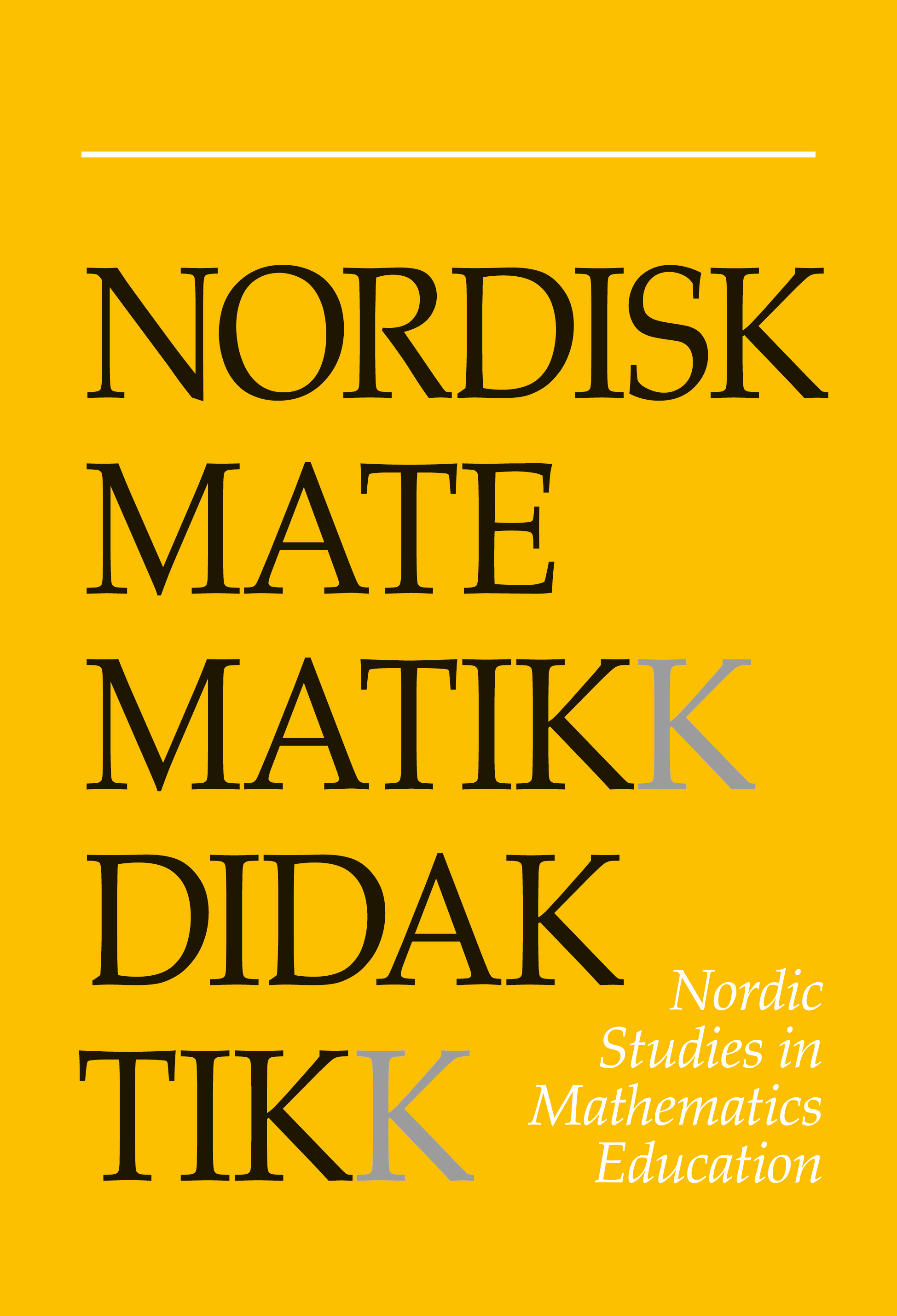Adaptive number knowledge among primary school students of various ages
DOI:
https://doi.org/10.7146/nomad.v27i4.149240Abstract
Previous studies have highlighted the importance of primary school students’ adaptive number knowledge, which includes knowledge of numerical characteristics and relations. In this study, students from the second (aged 8), fourth (aged 10), and sixth (aged 12) grades (n = 205) answered a modified version of the Arithmetic production task, which has been used to measure primary school students’ adaptive number knowledge. Significant differences among grade levels were found. In addition, a latent profile analysis revealed four profiles based on the students’ answers, with profile membership being associated with grade level. Similar to previous research, the current study found evidence of both age-dependent and individual differences. Furthermore, an analysis of the strategies used by the students to produce solutions revealed differences among the profiles.
References
Berlin, K. S., Williams, N. A. & Parra, G. R. (2014). An introduction to latent variable mixture modeling (part 1): overview and cross-sectional latent class and latent profile analyses. Journal of Pediatric Psychology, 39 (2), 174-187. https://doi.org/10.1093/jpepsy/jst084
Blöte, A. W., Klein, A. S. & Beishuizen, M. (2000). Mental computation and conceptual understanding. Learning and Instruction, 10 (3), 221-247. https://doi.org/10.1016/S0959-4752(99)00028-6
Brezovszky, B., McMullen, J., Veermans, K., Hannula-Sormunen, M. M., Rodríguez-Aflecht, G. et al. (2019). Effects of a mathematics game-based learning environment on primary school students' adaptive numberknowledge. Computers & Education, 128, 63-74. https://doi.org/10.1016/j.compedu.2018.09.011
Brezovszky, B., Rodrígues-Aflecht, G., McMullen, J., Veermans, K., Pongsakdi, N. et al. (2015). Developing adaptive number knowledge with the number navigation game-based learning environment. In J. Torbeyns, E. Lehtinen & J. Elen (Eds.), Describing and studying domain-specific serious games (pp. 155-170). Springer. https://doi.org/10.1007/978-3-319-20276-1_10
Gravemeijer, K., Bruin-Muurling, G., Kraemer, J.-M. & Stiphout, I. van (2016). Shortcomings of mathematics education reform in the netherlands: A paradigm case? Mathematical Thinking and Learning, 18 (1), 25-44. https://doi.org/10.1080/10986065.2016.1107821
Hästö, P. & Palkki, R. (2019). Finnish students' flexibility and its relation to speed and accuracy in equation solving. Nordic Studies in Mathematics Education, 24 (3-4), 43-58.
Hatano, G. (2003). Foreword. In A. J. Baroody & A. Dowker (Eds.), The development of arithmetic concepts and skills: constructing adaptive expertise (pp. xi-xiii). Lawrence Erlbaum.
Heinze, A., Star, J. R. & Verschaffel, L. (2009). Flexible and adaptive use of strategies and representations in mathematics education. ZDM, 41 (5), 535-540. https://doi.org/10.1007/s11858-009-0214-4
Krippendorff, K. (2004). Reliability in content analysis some common misconceptions and recommendations. Human Communication Research, 30 (3), 411-433. https://doi.org/10.1111/j.1468-2958.2004.tb00738.x
Lemaire, P. & Siegler, R. S. (1995). Four aspects of strategic change: contributions to children's learning of multiplication. Journal of Experimental Psychology: General, 124 (1), 83-97. https://doi.org/10.1037/0096-3445.124.1.83
McMullen, J., Brezovszky, B., Hannula-Sormunen, M. M., Veermans, K., Rodríguez-Aflecht, G. et al. (2017). Adaptive number knowledge and its relation to arithmetic and pre-algebra knowledge. Learning and Instruction, 49, 178-187. https://doi.org/10.1016/j.learninstruc.2017.02.001
McMullen, J., Brezovszky, B., Rodríguez-Aflecht, G., Pongsakdi, N., Hannula-Sormunen, M. M. & Lehtinen, E. (2016). Adaptive number knowledge: exploring the foundations of adaptivity with whole-number arithmetic. Learning and Individual Differences, 47, 172-181. https://doi.org/10.1016/j.lindif.2016.02.007
McMullen, J., Kanerva, K., Lehtinen, E., Hannula-Sormunen, M. M. & Kiuru, N. (2019). Adaptive number knowledge in secondary school students: profiles and antecedents. Journal of Numerical Cognition, 5 (3), 283-300. https://doi.org/10.5964/jnc.v5i3.201
Muthén, L. K. & Muthén, B. O. (2017). Mplus user's guide (8th ed.). Muthén & Muthén.
Nylund, K. L., Asparouhov, T. & Muthén, B. O. (2007). Deciding on the number of classes in latent class analysis and growth mixture modeling: a monte carlo simulation study. Structural Equation Modeling: a Multidisciplinary Journal, 14 (4), 535-569. https://doi.org/10.1080/10705510701575396
Opetushallitus (2016). National core curriculum for basic education 2014. Finnish National Board of Education. https://www.oph.fi/en/statistics-and-publications/publications/new-national-core-curriculum-basic-education-focus-school
Selter, C. (2009). Creativity, flexibility, adaptivity, and strategy use in mathematics. ZDM, 41 (5), 619-625. https://doi.org/10.1007/s11858-009-0203-7
Siegler, R. S. & Lemaire, P. (1997). Older and younger adults' strategy choices in multiplication: testing predictions of ASCM using the choice/no-choice method. Journal of Experimental Psychology: General, 126(1), 71-92. https://doi.org/10.1037/0096-3445.126.1.71
Siegler, R. S. & Shipley, C. (1995). Variation, selection, and cognitive change. In T. J. Simon & G. S. Halford (Eds.), Developing cognitive competence: new approaches to process modeling (pp. 31-76). Psychology Press.
Star, J. R. & Newton, K. J. (2009). The nature and development of experts' strategy flexibility for solving equations. ZDM, 41(5), 557-567. https://doi.org/10.1007/s11858-009-0185-5
Tein, J.-Y., Coxe, S. & Cham, H. (2013). Statistical power to detect the correct number of classes in latent profile analysis. Structural Equation Modeling: a Multidisciplinary Journal, 20 (4), 640-657. https://doi.org/10.1080/10705511.2013.824781
Threlfall, J. (2002). Flexible mental calculation. Educational Studies in Mathematics, 50 (1), 29-47. https://doi.org/10.1023/A:1020572803437
Van Dooren, W., De Bock, D. & Verschaffel, L. (2010). From addition to multiplication ... and back: the development of students' additive and multiplicative reasoning skills. Cognition and Instruction, 28 (3), 360-381. https://doi.org/10.1080/07370008.2010.488306
Verschaffel, L., Luwel, K., Torbeyns, J. & Van Dooren, W. (2009). Conceptualizing, investigating, and enhancing adaptive expertise in elementary mathematics education. European Journal of Psychology of Education, 24 (3), 335-359. https://doi.org/10.1007/BF03174765
Downloads
Published
How to Cite
Issue
Section
License

This work is licensed under a Creative Commons Attribution-NonCommercial-ShareAlike 4.0 International License.



